By Skënder Tufa
Part Five
Memorie.al / After the amnesty of 1982 and after the murder of Rexhep Geci, the situation worsened further in Spaç prison, where the police began to tighten internal regime measures with schedules, food lines and the extension of the waiting time on the terrace for appeal. At the end of January 1983, we were informed that part of Spaç prison would be transferred. A new prison had been opened near the Munelle Mountain in Puka, called Qafë-Bari, and laborers were needed for exploitation. Strong and problematic workers were included in the list that would be sent to the Puka mine. The transfer of about 200 prisoners was a great hardship for them, as they had to deliver blankets, sheets, mattresses and dishes, such as; bowl, spoon and gourd, you had to take your personal belongings from the warehouses and get them ready for inspection.
On May 22, 1984, an event of historical importance took place there (the Qafë-Bar Revolt), which I think should be followed up with the direct testimonies of the participants in it, to bring it as complete and closer to reality as possible. By collecting the pieces of facts expressed by the protagonists, a more complete vision can be created, which would resemble the restoration of a mosaic.
Continued from the previous issue
These surrendered because they had nothing to do. I am convinced that they would have raised the flag too, but they did not have time, because they did not leave them, they were under tension the whole time.
The police treated them very harshly, the spade bit was soft. They beat them with pickaxe bits, knocked them to the ground and massacred them. Then they threw them like sacks in the car. As we later learned, their trial was held, as had never happened before, for 6-10 days, and Sokol Sokoli and Tom Ndoja were sentenced to be shot.
NDUE KOLA
Later, as you know, the state oppresses you. The prison was surrounded by several cordons like soldiers, policemen, SAMP members and free riflemen. The people who came from Tirana promised that no one would be touched with a hand, – with the oath of men! But where has it ever been seen that communists have the oath?! They had us all put in rooms and whoever heard my name had to go downstairs.
They called me the fifth. As soon as I got to the corner of the canteen, some big men got on my back, tied my hands behind my back and, until we reached the meeting rooms, a corridor with guards escorting me with punches and kicks, they put me in a room where there were five of us, they also filled the other two rooms that were used for meetings.
I remember that they were with me; Lazër Shkëmbi, Nikoll Prenga, Kolë Shkëmbi and Tom Ndoja. After they brought in all the people on the list, the policemen dressed in black, who had come from Tirana, entered the rooms where we were and made an inhuman scene. Young, healthy as horses, they shot mercilessly with the tails of pickaxes, with stove wood, with their feet. One group would leave, the others would come.
The room turned into a “slaughterhouse”, there was only blood on the floor and walls. I don’t know how we got out of their hands alive?! After they beat us for a few hours, around 3-4 p.m., when the first shift was coming off work, they dragged us out into the yard, left us a little covered in blood, so that our friends who had been in the gallery could see us, and then they tied us up and threw us like sacks into two large military vehicles, covered with raincoats. Even along the way, the SAMP police who accompanied us beat us with sticks and kicked us with those spiked shoes from below. Everywhere there was only blood, screams and screams, curses, insults, until we arrived in Puka.
When we got off, a corridor of policemen with clubs in their hands was waiting for us, who were pushing us down because we had no strength left, we couldn’t even stand up, in the dungeon they tied us up two by two. Everyone was like dead, but my left shoulder and neck were gone on one side and I had black blood, all the way down to my feet. After 3-4 days, they took me to the investigator, they asked me; “who organized the revolt, why did you oppose the police”?!
Then I was taken by investigator Gavrosh Andoni, for two days, and after him, investigator Ylber Shehu took me, he asked me: – “Who beat you? How did the incident happen”? In the dungeons of Puka, policeman Ndue Qymyri, beat me in the bathroom, because I refused to drink tea without sugar. Hysen Tabaku and Lazër Shkëmbi washed my blood and put me in a room, because Kolq Shkëmbi was sick and could not help.
The Puka branch was put at the disposal of the Special Investigation Department of Tirana. I was among the 12 prisoners who were not sentenced. On the 5th or 6th (if I remember correctly), three prison vans arrived, in the first they put Tom Ndoja and Sokl Sokol, in the other two they put us and sent us to the Zejmen prison, where they would again torture us cruelly. They put us in two dungeon rooms and let us go, beating us inhumanly!
Here too, one group came out and the other group came in, beaten with sessions. When they finished beating us, policeman Anton Lapi made a cross on our heads with a clipper, while he put his shoe in my mouth, saying: – “Hey, you took Ndue Kola, how are you going to take power from us”?
Haxhi Bazhinovski and Llazi Koçi told him: – “These crosses you are making on our heads now will soon become a Church and a Mosque”. They immediately started beating us again. I was the weakest and Edmond Mustafarai said: “Don’t hit him, he is sick, come on, and hit me”. They didn’t give us any bread or water.
The prison bellman, an orderly named Idriz Derbishina, brought a bowl of water. We had a fever and a chill, but no one asked about us. The next day at 9 am, 11 of us who had been sentenced were sent by motor-prison to Burrel, the other 11 were sent to Spaç
HADXHI BAJINOVSKI
As soon as I got to the stairs, they grabbed me by the arms, put the irons on me and did not let my feet touch the ground. They divided us into groups in three meeting rooms. There was thick firewood, stumps. Sokol Progri tells me; – “We should put them under the bed, so they won’t see them”. – I tell him; – “Put them in as much as you want, they will still find them, because that’s what they brought them here for”!.
Over twenty people entered the room, all of them like horses, and they attacked us with fists, kicks, shovels, pickaxes, and firewood. I don’t know, but I can’t believe there could be more people like that in this world. They didn’t ask where they were shooting, they were furious, they were all beasts, and they made the place look like a butcher. There was only blood, they broke my leg and arm, and just as I was, they fell on me again.
Pain that I had never experienced in my life. I fainted, they threw water at me, and they hit me with sticks again. I couldn’t feel my body anymore. And they took us out on a stretcher to the court, because I couldn’t walk on my own. I don’t know how long that massacre lasted, but it seemed like a lifetime to me. My spirit is strong and I didn’t give up easily!
For several hours they left us like corpses, no one could speak, but they didn’t dare to say that they were ready. They left us like that until the first shift came. They turned all the prisoners to face us, so that they could see how they had beaten us. They threw us like sacks into the IFA carriage, to instill terror, and we were sentenced for terrorism, a sentence that even though democracy has come, has not been lifted from us yet?!
The interrogators made us violent, they wanted us to talk about; how we would take power, how we would escape? I don’t know why it was changed, but they wanted to make two groups, because they always had the same working method, they created the “Western Group” and the “Eastern Group”, for this 24 people were arrested. 12 for each group. Finally, they sentenced only 12 of us, with the charge of “counter-revolutionary organization, with the aim of overthrowing and seizing popular power”!!
How we would take power from these people, who didn’t even have a spoon, I don’t know! With these empty accusations, they shot Toma and Sokol. I was in a dungeon with Toma. “I was tied head and foot in this dungeon when they sentenced me to death years ago,” Toma tells me. The report of the Ministry of the Interior states that; 38 people were implicated in the Qaf-Bar rebellion, 24 of whom were arrested that day.
The people on the first list, arrested on May 22, 1984, are:
Sokol Sokoli, Sokol Progni, Tom Ndoja, Lush Bushgjoka, Haxhi Baxhinovski, Vllasi Koçi, Kostandin Gjordeni, Bajram Vuthi, Martin Leka, Lazër Shkëmbi, Hysen Tabaku, Ndue Pisha, Petrit Moriseni, Agim Karameta, Ramazan Spahiu, Nikolle Prenga, Kolë Shkambi, Ndue Kola, Edmond Mustafaraj, Ded Martini, Xhemal Tota, Ded Nimani, Mark Ndoci, Martin Pjetri,
The last 12 make it clear to us that the people who should have been punished were targeted, since they are not punished with the others. This reasoning is also complemented by the impunity of Ndrek Nikolli who, together with Ndue Pisha, opposed going to work. With an expedited procedure and with pre-prepared sentences, on June 3, 1984, the Criminal College of the Supreme Court closed this case, giving the following sentences:
-Sokol Sokoli, death by firing squad; Tom Ndoja, death by firing squad; – Sokol Progni, 25 years in prison; Vllasi Koçi, 25 years in prison; – Martin Leka, 16 years in prison; – Haxhi Baxhonovski, 21 years in prison; – Bajram Vuthi, 15 years in prison; – Ndue Pisha, 25 years in prison; – Lush Bushgjoka, 12 years in prison; – Kostandin Gjordeni, 10 years in prison; – Lazër Shkëmbi, 12 years in prison – Hysen Tabaku, 11 years in prison.
There was a grave silence after the first 24 were taken, who after the massacre were thrown like sacks into the body of the car, and the anxiety of terror had entered every prisoner who, at any moment, could fall into the clutches of the executioners. Inside the prison premises, there were twice as many Special Forces and police officers as prisoners! They left us sitting like that for several hours. Numerous police officers circled like crows around the convicts. The slightest complaint cost you dearly. Then the actions in the cafeteria began, but who could pass the bite, we thought about those who escaped, they were taken like sacks and, who knew where they were thrown?!
SHOES
Anything unexpected could await each of us; we passed with our eyes down like the defeated, from the hordes that were going to the sword. In the evening we go to sleep. I slept in “Maunja” on the left side when you entered; my bed was probably the tenth from the door, behind me was Mihal Shtetos, a very good and studious Nartjot.
Thinking that it might be our turn, Ahmeti, Fatmir and I took clean clothes from our bags and changed, so that whatever happened to us, we would be in clean clothes. I remember the fighters who wore the shroud around the prison. I also took my shoes. They had a story of their own. For the first time I had been able to have a pair of shoes made to order and I was able to wear them two or three times, and when they arrested me I was wearing them.
With them I entered the dungeon, with them I went to “Kaush” (the gathering place for convicts from all districts, from there they were divided into the prison camps that they had assigned to them), and with them I went to Spaç. They weren’t allowed there, so I put them in bags and put on rubber boots. When the amnesty of 1982 was held, before those who were to be released came out, I saw Gole, the prison shoemaker, wearing them. As soon as I saw him on foot, I recognized him, I don’t know, but I was obsessed with the fact that I had made my way to prison with them and that I would leave with them. – “Where did you get these shoes?” I said nervously.
He stopped and said to me: – “I have been in prison for a long time and I will be released, so let me have them, I will pay you.” – “No – I said – you didn’t ask me, but you took them from the bag and a man who opens another’s bag, you know very well what it is, so now go to the warehouse and give me the shoes.” When the warehouseman saw us, Haxhi Muka said to him; – “Why did you put them on so quickly, you didn’t even wait a second”?! We were friends, so I didn’t take it too long, but I took them and put them back in their place. He had fixed them, because they were new, but they were made with wooden nails and because of the humidity, they were open. The master had made them as he liked.
When the revolt broke out and we went up to the high field, everyone started to dress well and thickly, in order to protect ourselves somehow from the wood. At dinner, when we were in bed, policeman Fiqiri Çakalli and Abaz Bërhan come to the door of the shed and look at my bed. The next morning, the shoes were gone! I put on a pair of slippers and hurried out with the others.
THE ARRESTS OF THE SECOND DAY
The dire situation continued inside the prison. Many police officers served for over a week inside these premises, covering them with the shadow of state terror. On the second day, May 23, 1984, the second group of prisoners was arrested and subjected to brutal treatment, consisting of 14 prisoners, here is the list of names according to the reports of the Ministry of Interior: Dalip Zhabolli, Drago Vujošević, Sadri Sokoli, Nuredin Skrapari, Anastas Dhami, Roland Tole, Sali Gaca, Ilirjan Manushi, Hajredin Fratari, Lulash Bushgjoka, Xhemal Mustafraj, Veiz Ceci, Agron Hoxha, Çajup Bejko.
NUREDIN SKRAPARI
After they had taken the “roots” and left the “branches”, the next day they took us and sat us in the square in front of the canteen. I remember an operative from the Ministry of Interior; I don’t remember his name (Lekë Ymeri), who, with a long list in his hand, started calling out names. The first on the list was Dalip Zhabolli, a former senior officer, commander of the Mat Corps, sentenced by a military court to 25 years in prison; they put the “bracelet” on him in front of us. The second was called Dr. Drago Vujošević, a Montenegrin, who had been a doctor in Gjirokastra and they put the “bracelet” on him.
He also had a son who was a political prisoner in Spaç. The third was called Sadri Sokoli. This was the nephew of Sadik Bekteshi, a general of the War. After they imprisoned him, they also put his nephew in prison. Sadriu had been the director of MEKS (a military ammunition production enterprise) and had studied in the Soviet Union. The fourth was my name. Without standing up, three or four policemen attacked me, because I was a little stronger than the others, they put “bracelets” on me too. They took us into the meeting rooms. That’s where the beating started.
Zylyftar Ramizi came to me and said: – “Are you Nuredin Skrapari”? – I told him: “Those who told you were not wrong”.
– “Do you know who this is? He has broken the portrait of the great and glorious leader of our Party, shoot him”, – he said. There were about twenty policemen, one of them hit me with a shovel, but I was wearing a prison coat and I didn’t feel it much. – “Don’t hit the engineer with a shovel,” someone said, – but with a pickaxe.” Before long, someone fell on my shoulder with a pickaxe and broke my bone, the pain was great, and they all jumped on me with punches, kicks and sticks. They made me collapse, without tension.
They hit me about nine times and said; “let go, the cat has seven souls, this one has eleven”! They threw water at me. I seemed to calm down from that extraordinary pain from the water. Then they sent us to the dungeon and the next day, they sent us to the Zejmen camp. I was the most seriously injured, my friends helped me. Luckily, there was also an oil engineer there, Teki Biçoku, an academic, who intervened and took me to the hospital, to the intensive care unit, where they gave me about twenty kg. of glucose. I was treated by the doctor Ramazan Xhaja, whom I met after I got out of prison.
When I went to Zejmen, I found out that Tom Ndojë and Sokol Sokoli had been shot, while Sadri Sokoli had died on the way, as Dr. Drago told me, the police had provoked him, he had reacted, they had hit him in the “bulbi rakildjam” (back of the head) and he had vomited white and, when he had gone to Puka in his cell, he had died. Sandri (as they called him), was buried in a corner opposite the prison, where there were other prisoners who had lost their lives in this prison. This is how this revolt ended, with blood and iron. Memorie.al




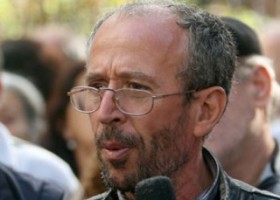
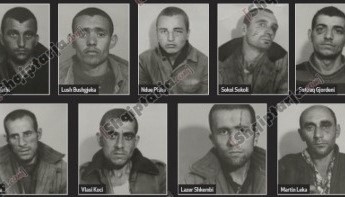
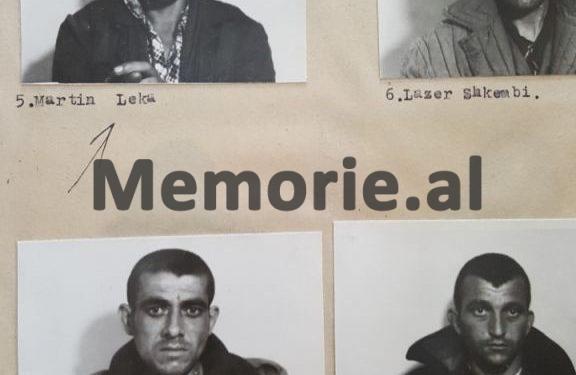
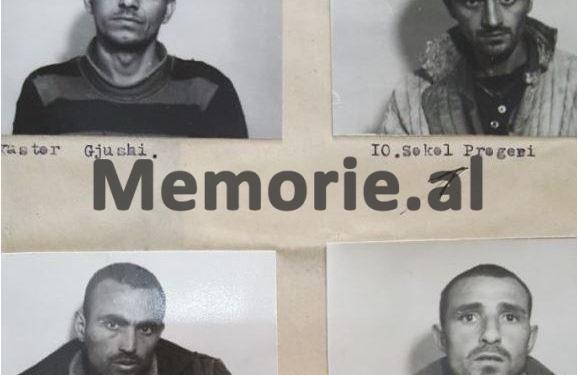
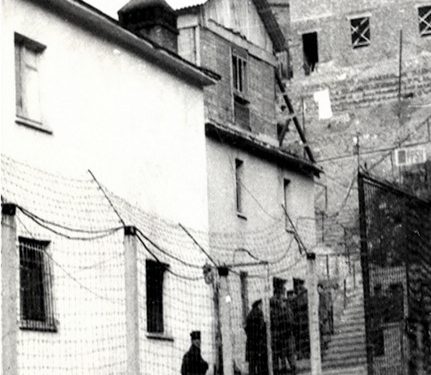
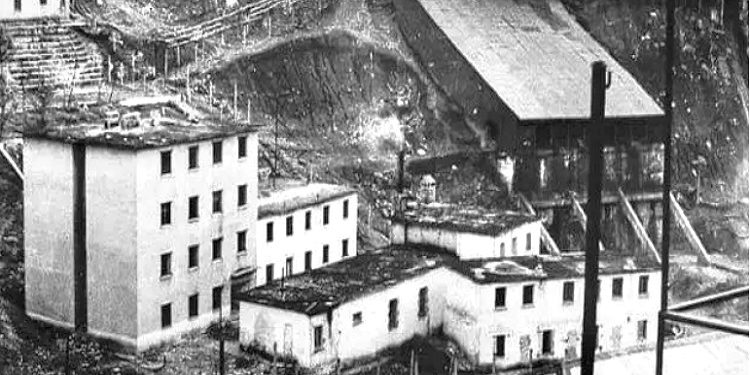


![“The ensemble, led by saxophonist M. Murthi, violinist M. Tare, [with] S. Reka on accordion and piano, [and] saxophonist S. Selmani, were…”/ The unknown history of the “Dajti” orchestra during the communist regime.](https://memorie.al/wp-content/uploads/2026/02/admin-ajax-3-350x250.jpg)
![“In an attempt to rescue one another, 10 workers were poisoned, but besides the brigadier, [another] 6 also died…”/ The secret document of June 11, 1979, is revealed, regarding the deaths of 6 employees at the Metallurgy Plant.](https://memorie.al/wp-content/uploads/2026/02/maxresdefault-350x250.jpg)


